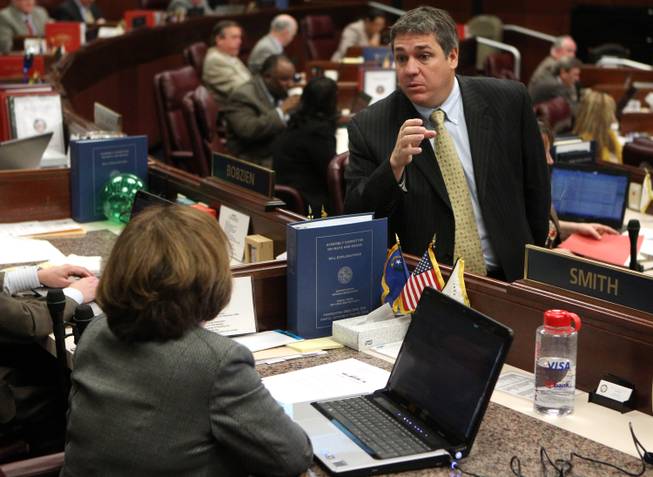
AP Photo/Cathleen Allison
Nevada Assembly Democrats Marcus Conklin and Debbie Smith talk on the Assembly floor on Friday, April 29, 2011, at the Legislature in Carson City. Earlier Friday, their Assembly Ways and Means committee heard testimony on a bill that would reduce sick and vacation days and reduce premium holiday pay for state workers.
Friday, April 29, 2011 | 1:10 p.m.
Sun Coverage
CARSON CITY – Some state workers would qualify for food stamps if proposed cuts in pay and benefits are approved, a labor representative says.
Kevin Ranft of the American Federation of State, County and Municipal Employees, said a bill to reduce overtime pay, sick and annual leave was “another attack” on state workers. He and others testified today before the Assembly Ways and Means Committee to oppose Assembly Bill 560, which would also continue suspension of merit and longevity pay.
Gov. Brian Sandoval's proposal also calls for a 5 percent cut in pay and a requirement that workers pay about 1 percent more to the retirement system.
State workers now must take one furlough day a month without pay, which equates to a 4.6 percent salary reduction. That would be replaced by the 5 percent pay reduction.
Ranft said cuts would mean the state would face problems finding employees in the future.
Julia Teska, an analyst in the state Budget Division, told the committee that a survey of 10 western states showed Nevada’s annual and sick leave benefits for workers were above average.
A state worker on the job for one to 10 years earns 120 hours of annual leave. Those with 11-15 years are credited with 144 hours and those with 16 years and above receive 168 hours of annual leave.
The bill lowers that to 96 hours for those workers with 1-5 years of experience; 120 hours for those with 6-15 years; 144 hours with those with 16-20 years; and keeps it at 168 hours for those with 21 or more years on the job.
Teska said the state now picks up five years of retirement payments for an employee whose job is eliminated due to budget reductions. For those hired after July 1, this benefit would be eliminated. But the state would still pay six months of their insurance premium.
This change would be less costly but benefit more workers, Teska said.
The committee didn't take action on the bill.

Join the Discussion:
Check this out for a full explanation of our conversion to the LiveFyre commenting system and instructions on how to sign up for an account.
Full comments policy